Agency Law: A Comprehensive Analysis of Duties and Relationships in UK
VerifiedAdded on 2023/01/13
|15
|5673
|83
Report
AI Summary
This report provides a comprehensive overview of agency law within the UK commercial legal framework. It defines agency, distinguishing the roles of principals, agents, and third parties, and explores the formation of agency relationships, emphasizing the importance of authority, both actual and implied. The report delves into the duties of agents, including following instructions, exercising care and skill, avoiding conflicts of interest, accounting for funds, and refraining from delegating authority or accepting bribes. Furthermore, the report examines agency within specific contexts like employment, partnership, and company law, outlining the rights, duties, and liabilities of agents and principals in each scenario. The report incorporates relevant case law to illustrate key legal principles and provides a thorough analysis of the legal implications of agency relationships.
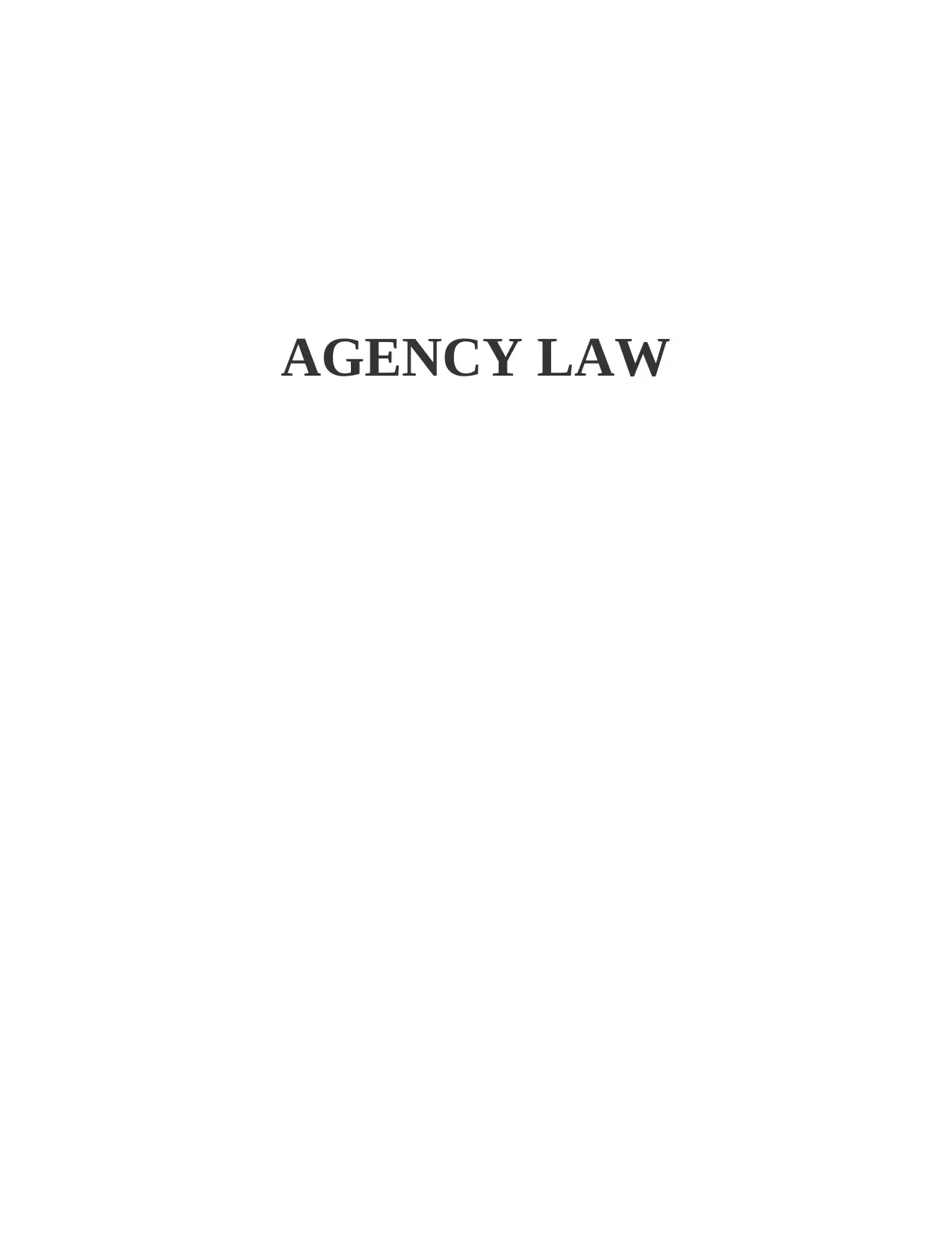
AGENCY LAW
Paraphrase This Document
Need a fresh take? Get an instant paraphrase of this document with our AI Paraphraser
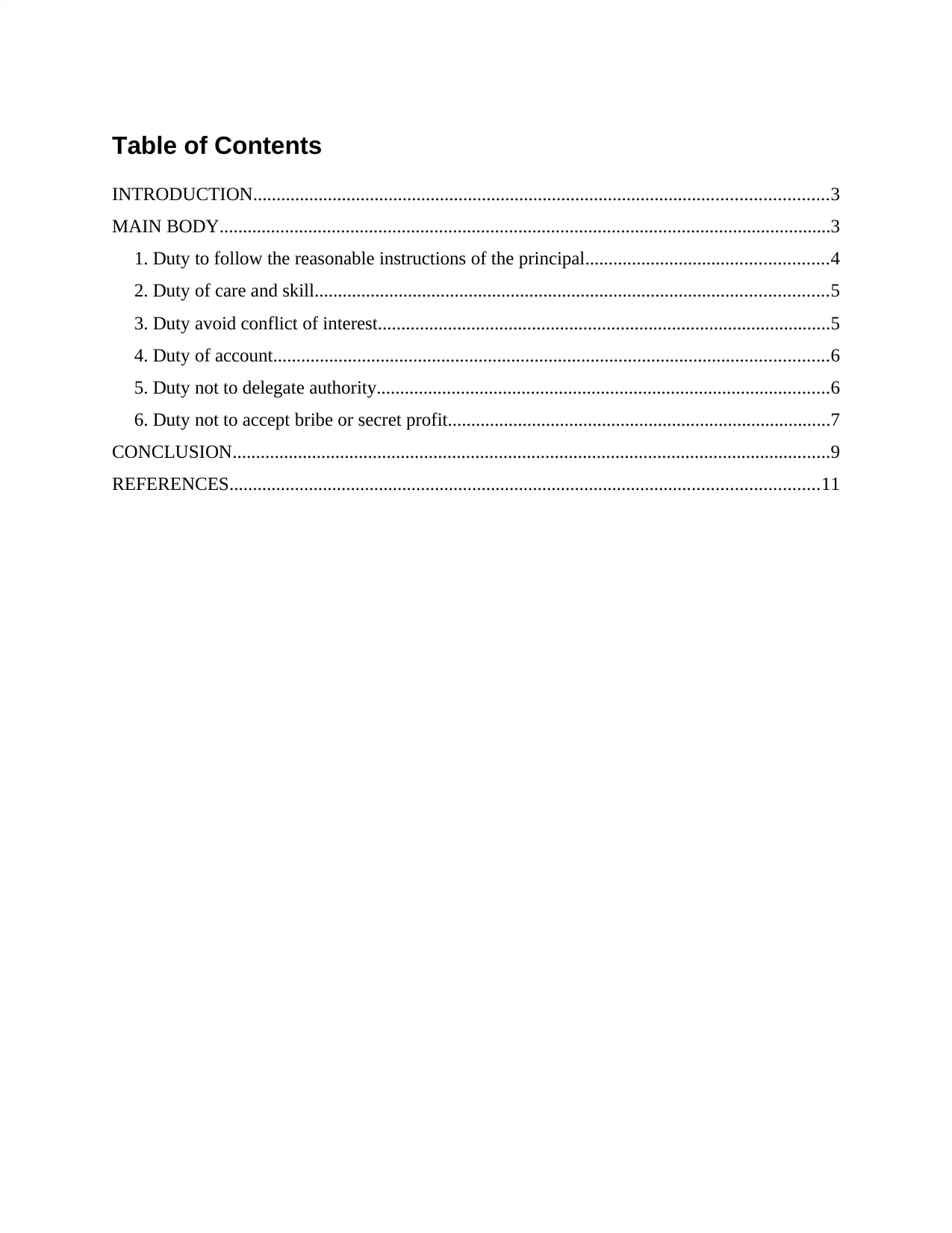
Table of Contents
INTRODUCTION...........................................................................................................................3
MAIN BODY...................................................................................................................................3
1. Duty to follow the reasonable instructions of the principal....................................................4
2. Duty of care and skill..............................................................................................................5
3. Duty avoid conflict of interest.................................................................................................5
4. Duty of account.......................................................................................................................6
5. Duty not to delegate authority.................................................................................................6
6. Duty not to accept bribe or secret profit..................................................................................7
CONCLUSION................................................................................................................................9
REFERENCES..............................................................................................................................11
INTRODUCTION...........................................................................................................................3
MAIN BODY...................................................................................................................................3
1. Duty to follow the reasonable instructions of the principal....................................................4
2. Duty of care and skill..............................................................................................................5
3. Duty avoid conflict of interest.................................................................................................5
4. Duty of account.......................................................................................................................6
5. Duty not to delegate authority.................................................................................................6
6. Duty not to accept bribe or secret profit..................................................................................7
CONCLUSION................................................................................................................................9
REFERENCES..............................................................................................................................11
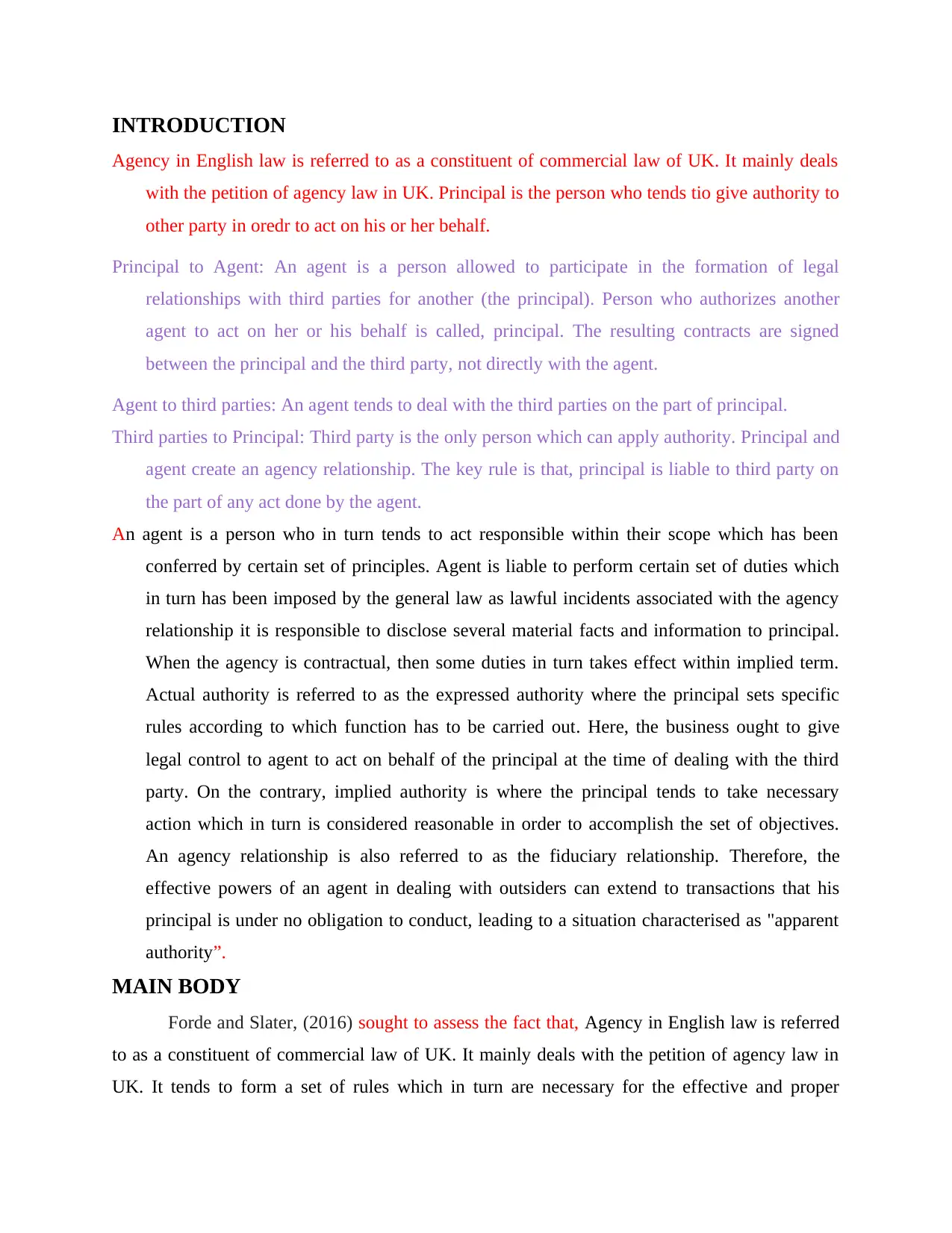
INTRODUCTION
Agency in English law is referred to as a constituent of commercial law of UK. It mainly deals
with the petition of agency law in UK. Principal is the person who tends tio give authority to
other party in oredr to act on his or her behalf.
Principal to Agent: An agent is a person allowed to participate in the formation of legal
relationships with third parties for another (the principal). Person who authorizes another
agent to act on her or his behalf is called, principal. The resulting contracts are signed
between the principal and the third party, not directly with the agent.
Agent to third parties: An agent tends to deal with the third parties on the part of principal.
Third parties to Principal: Third party is the only person which can apply authority. Principal and
agent create an agency relationship. The key rule is that, principal is liable to third party on
the part of any act done by the agent.
An agent is a person who in turn tends to act responsible within their scope which has been
conferred by certain set of principles. Agent is liable to perform certain set of duties which
in turn has been imposed by the general law as lawful incidents associated with the agency
relationship it is responsible to disclose several material facts and information to principal.
When the agency is contractual, then some duties in turn takes effect within implied term.
Actual authority is referred to as the expressed authority where the principal sets specific
rules according to which function has to be carried out. Here, the business ought to give
legal control to agent to act on behalf of the principal at the time of dealing with the third
party. On the contrary, implied authority is where the principal tends to take necessary
action which in turn is considered reasonable in order to accomplish the set of objectives.
An agency relationship is also referred to as the fiduciary relationship. Therefore, the
effective powers of an agent in dealing with outsiders can extend to transactions that his
principal is under no obligation to conduct, leading to a situation characterised as "apparent
authority”.
MAIN BODY
Forde and Slater, (2016) sought to assess the fact that, Agency in English law is referred
to as a constituent of commercial law of UK. It mainly deals with the petition of agency law in
UK. It tends to form a set of rules which in turn are necessary for the effective and proper
Agency in English law is referred to as a constituent of commercial law of UK. It mainly deals
with the petition of agency law in UK. Principal is the person who tends tio give authority to
other party in oredr to act on his or her behalf.
Principal to Agent: An agent is a person allowed to participate in the formation of legal
relationships with third parties for another (the principal). Person who authorizes another
agent to act on her or his behalf is called, principal. The resulting contracts are signed
between the principal and the third party, not directly with the agent.
Agent to third parties: An agent tends to deal with the third parties on the part of principal.
Third parties to Principal: Third party is the only person which can apply authority. Principal and
agent create an agency relationship. The key rule is that, principal is liable to third party on
the part of any act done by the agent.
An agent is a person who in turn tends to act responsible within their scope which has been
conferred by certain set of principles. Agent is liable to perform certain set of duties which
in turn has been imposed by the general law as lawful incidents associated with the agency
relationship it is responsible to disclose several material facts and information to principal.
When the agency is contractual, then some duties in turn takes effect within implied term.
Actual authority is referred to as the expressed authority where the principal sets specific
rules according to which function has to be carried out. Here, the business ought to give
legal control to agent to act on behalf of the principal at the time of dealing with the third
party. On the contrary, implied authority is where the principal tends to take necessary
action which in turn is considered reasonable in order to accomplish the set of objectives.
An agency relationship is also referred to as the fiduciary relationship. Therefore, the
effective powers of an agent in dealing with outsiders can extend to transactions that his
principal is under no obligation to conduct, leading to a situation characterised as "apparent
authority”.
MAIN BODY
Forde and Slater, (2016) sought to assess the fact that, Agency in English law is referred
to as a constituent of commercial law of UK. It mainly deals with the petition of agency law in
UK. It tends to form a set of rules which in turn are necessary for the effective and proper
⊘ This is a preview!⊘
Do you want full access?
Subscribe today to unlock all pages.

Trusted by 1+ million students worldwide
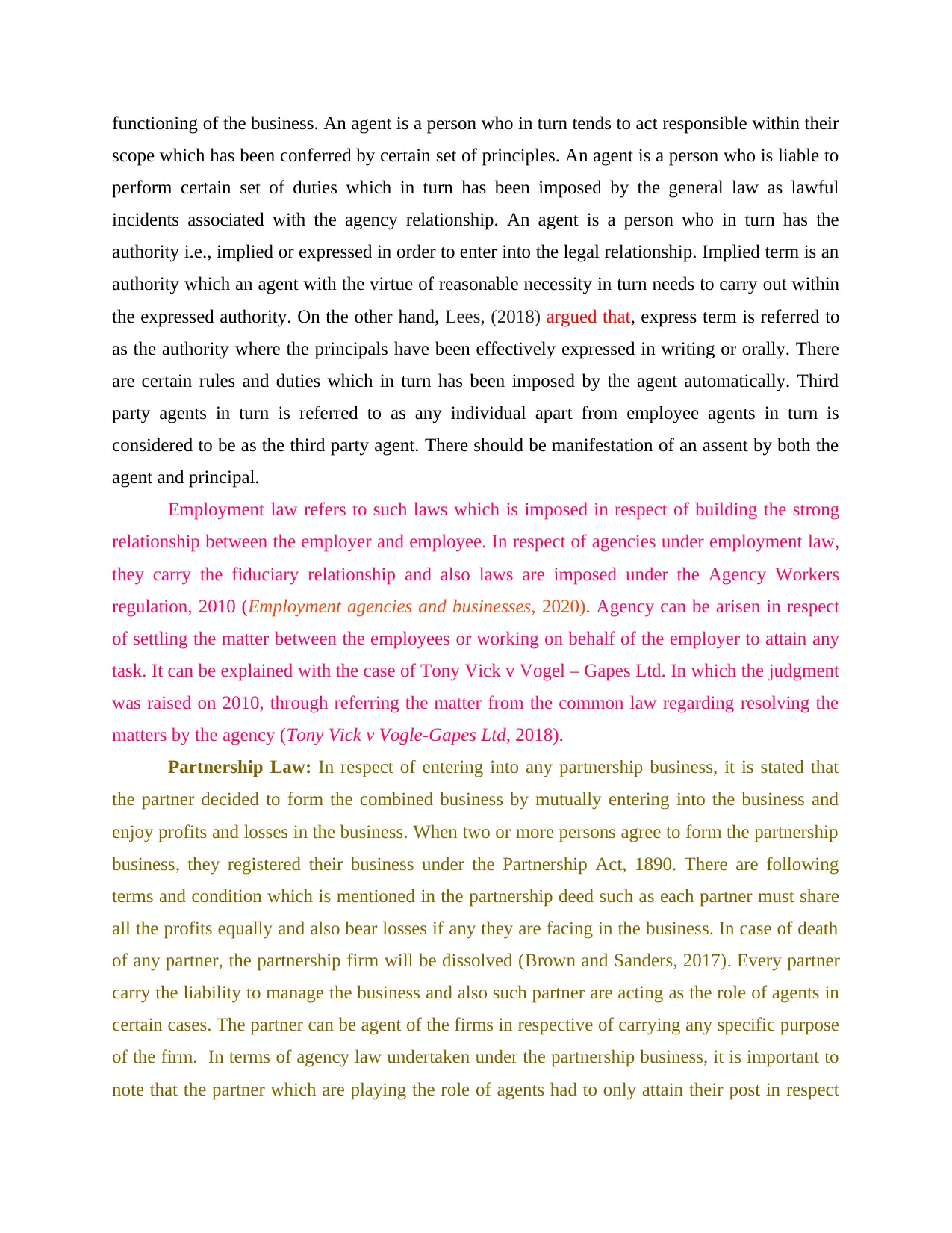
functioning of the business. An agent is a person who in turn tends to act responsible within their
scope which has been conferred by certain set of principles. An agent is a person who is liable to
perform certain set of duties which in turn has been imposed by the general law as lawful
incidents associated with the agency relationship. An agent is a person who in turn has the
authority i.e., implied or expressed in order to enter into the legal relationship. Implied term is an
authority which an agent with the virtue of reasonable necessity in turn needs to carry out within
the expressed authority. On the other hand, Lees, (2018) argued that, express term is referred to
as the authority where the principals have been effectively expressed in writing or orally. There
are certain rules and duties which in turn has been imposed by the agent automatically. Third
party agents in turn is referred to as any individual apart from employee agents in turn is
considered to be as the third party agent. There should be manifestation of an assent by both the
agent and principal.
Employment law refers to such laws which is imposed in respect of building the strong
relationship between the employer and employee. In respect of agencies under employment law,
they carry the fiduciary relationship and also laws are imposed under the Agency Workers
regulation, 2010 (Employment agencies and businesses, 2020). Agency can be arisen in respect
of settling the matter between the employees or working on behalf of the employer to attain any
task. It can be explained with the case of Tony Vick v Vogel – Gapes Ltd. In which the judgment
was raised on 2010, through referring the matter from the common law regarding resolving the
matters by the agency (Tony Vick v Vogle-Gapes Ltd, 2018).
Partnership Law: In respect of entering into any partnership business, it is stated that
the partner decided to form the combined business by mutually entering into the business and
enjoy profits and losses in the business. When two or more persons agree to form the partnership
business, they registered their business under the Partnership Act, 1890. There are following
terms and condition which is mentioned in the partnership deed such as each partner must share
all the profits equally and also bear losses if any they are facing in the business. In case of death
of any partner, the partnership firm will be dissolved (Brown and Sanders, 2017). Every partner
carry the liability to manage the business and also such partner are acting as the role of agents in
certain cases. The partner can be agent of the firms in respective of carrying any specific purpose
of the firm. In terms of agency law undertaken under the partnership business, it is important to
note that the partner which are playing the role of agents had to only attain their post in respect
scope which has been conferred by certain set of principles. An agent is a person who is liable to
perform certain set of duties which in turn has been imposed by the general law as lawful
incidents associated with the agency relationship. An agent is a person who in turn has the
authority i.e., implied or expressed in order to enter into the legal relationship. Implied term is an
authority which an agent with the virtue of reasonable necessity in turn needs to carry out within
the expressed authority. On the other hand, Lees, (2018) argued that, express term is referred to
as the authority where the principals have been effectively expressed in writing or orally. There
are certain rules and duties which in turn has been imposed by the agent automatically. Third
party agents in turn is referred to as any individual apart from employee agents in turn is
considered to be as the third party agent. There should be manifestation of an assent by both the
agent and principal.
Employment law refers to such laws which is imposed in respect of building the strong
relationship between the employer and employee. In respect of agencies under employment law,
they carry the fiduciary relationship and also laws are imposed under the Agency Workers
regulation, 2010 (Employment agencies and businesses, 2020). Agency can be arisen in respect
of settling the matter between the employees or working on behalf of the employer to attain any
task. It can be explained with the case of Tony Vick v Vogel – Gapes Ltd. In which the judgment
was raised on 2010, through referring the matter from the common law regarding resolving the
matters by the agency (Tony Vick v Vogle-Gapes Ltd, 2018).
Partnership Law: In respect of entering into any partnership business, it is stated that
the partner decided to form the combined business by mutually entering into the business and
enjoy profits and losses in the business. When two or more persons agree to form the partnership
business, they registered their business under the Partnership Act, 1890. There are following
terms and condition which is mentioned in the partnership deed such as each partner must share
all the profits equally and also bear losses if any they are facing in the business. In case of death
of any partner, the partnership firm will be dissolved (Brown and Sanders, 2017). Every partner
carry the liability to manage the business and also such partner are acting as the role of agents in
certain cases. The partner can be agent of the firms in respective of carrying any specific purpose
of the firm. In terms of agency law undertaken under the partnership business, it is important to
note that the partner which are playing the role of agents had to only attain their post in respect
Paraphrase This Document
Need a fresh take? Get an instant paraphrase of this document with our AI Paraphraser
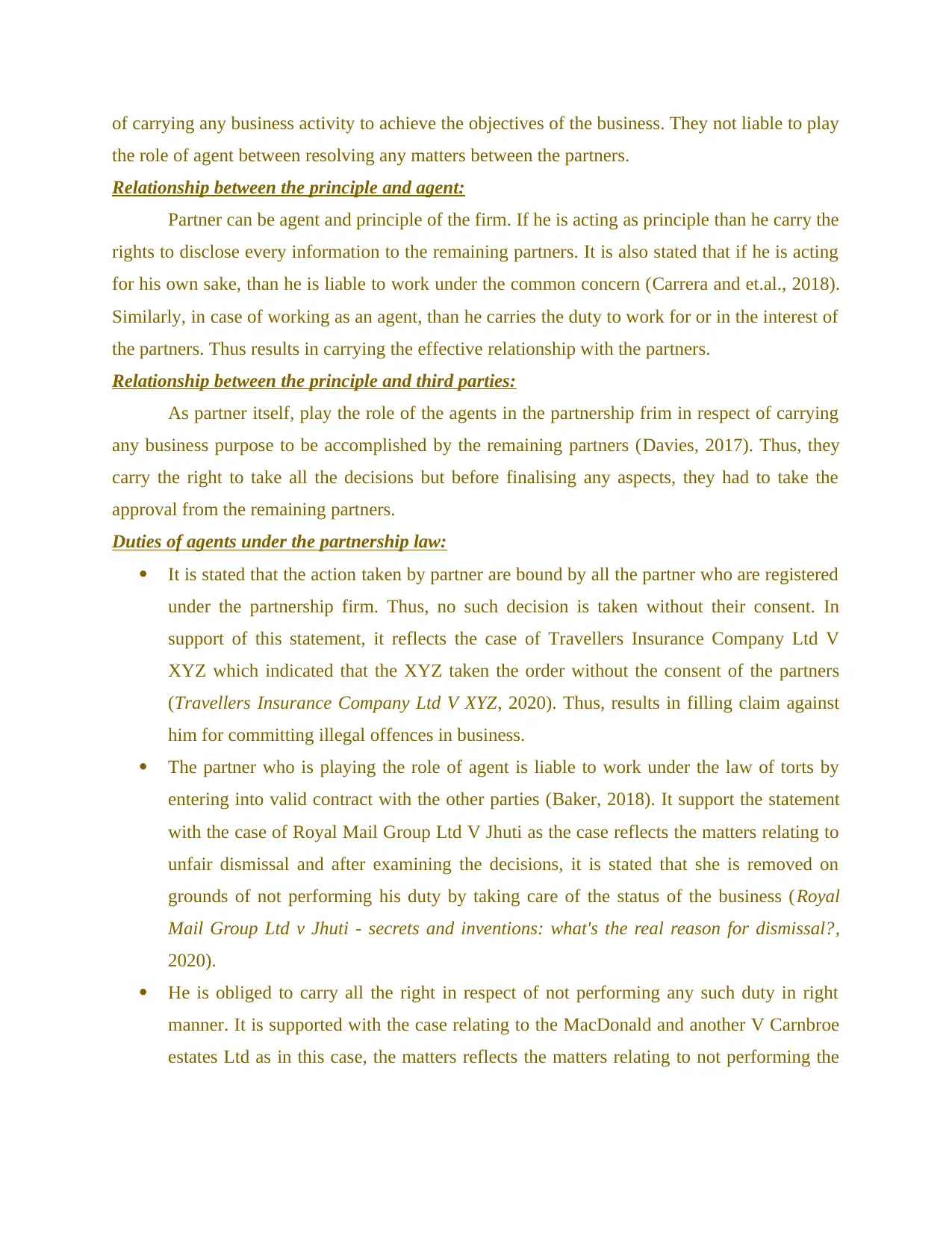
of carrying any business activity to achieve the objectives of the business. They not liable to play
the role of agent between resolving any matters between the partners.
Relationship between the principle and agent:
Partner can be agent and principle of the firm. If he is acting as principle than he carry the
rights to disclose every information to the remaining partners. It is also stated that if he is acting
for his own sake, than he is liable to work under the common concern (Carrera and et.al., 2018).
Similarly, in case of working as an agent, than he carries the duty to work for or in the interest of
the partners. Thus results in carrying the effective relationship with the partners.
Relationship between the principle and third parties:
As partner itself, play the role of the agents in the partnership frim in respect of carrying
any business purpose to be accomplished by the remaining partners (Davies, 2017). Thus, they
carry the right to take all the decisions but before finalising any aspects, they had to take the
approval from the remaining partners.
Duties of agents under the partnership law:
It is stated that the action taken by partner are bound by all the partner who are registered
under the partnership firm. Thus, no such decision is taken without their consent. In
support of this statement, it reflects the case of Travellers Insurance Company Ltd V
XYZ which indicated that the XYZ taken the order without the consent of the partners
(Travellers Insurance Company Ltd V XYZ, 2020). Thus, results in filling claim against
him for committing illegal offences in business.
The partner who is playing the role of agent is liable to work under the law of torts by
entering into valid contract with the other parties (Baker, 2018). It support the statement
with the case of Royal Mail Group Ltd V Jhuti as the case reflects the matters relating to
unfair dismissal and after examining the decisions, it is stated that she is removed on
grounds of not performing his duty by taking care of the status of the business (Royal
Mail Group Ltd v Jhuti - secrets and inventions: what's the real reason for dismissal?,
2020).
He is obliged to carry all the right in respect of not performing any such duty in right
manner. It is supported with the case relating to the MacDonald and another V Carnbroe
estates Ltd as in this case, the matters reflects the matters relating to not performing the
the role of agent between resolving any matters between the partners.
Relationship between the principle and agent:
Partner can be agent and principle of the firm. If he is acting as principle than he carry the
rights to disclose every information to the remaining partners. It is also stated that if he is acting
for his own sake, than he is liable to work under the common concern (Carrera and et.al., 2018).
Similarly, in case of working as an agent, than he carries the duty to work for or in the interest of
the partners. Thus results in carrying the effective relationship with the partners.
Relationship between the principle and third parties:
As partner itself, play the role of the agents in the partnership frim in respect of carrying
any business purpose to be accomplished by the remaining partners (Davies, 2017). Thus, they
carry the right to take all the decisions but before finalising any aspects, they had to take the
approval from the remaining partners.
Duties of agents under the partnership law:
It is stated that the action taken by partner are bound by all the partner who are registered
under the partnership firm. Thus, no such decision is taken without their consent. In
support of this statement, it reflects the case of Travellers Insurance Company Ltd V
XYZ which indicated that the XYZ taken the order without the consent of the partners
(Travellers Insurance Company Ltd V XYZ, 2020). Thus, results in filling claim against
him for committing illegal offences in business.
The partner who is playing the role of agent is liable to work under the law of torts by
entering into valid contract with the other parties (Baker, 2018). It support the statement
with the case of Royal Mail Group Ltd V Jhuti as the case reflects the matters relating to
unfair dismissal and after examining the decisions, it is stated that she is removed on
grounds of not performing his duty by taking care of the status of the business (Royal
Mail Group Ltd v Jhuti - secrets and inventions: what's the real reason for dismissal?,
2020).
He is obliged to carry all the right in respect of not performing any such duty in right
manner. It is supported with the case relating to the MacDonald and another V Carnbroe
estates Ltd as in this case, the matters reflects the matters relating to not performing the
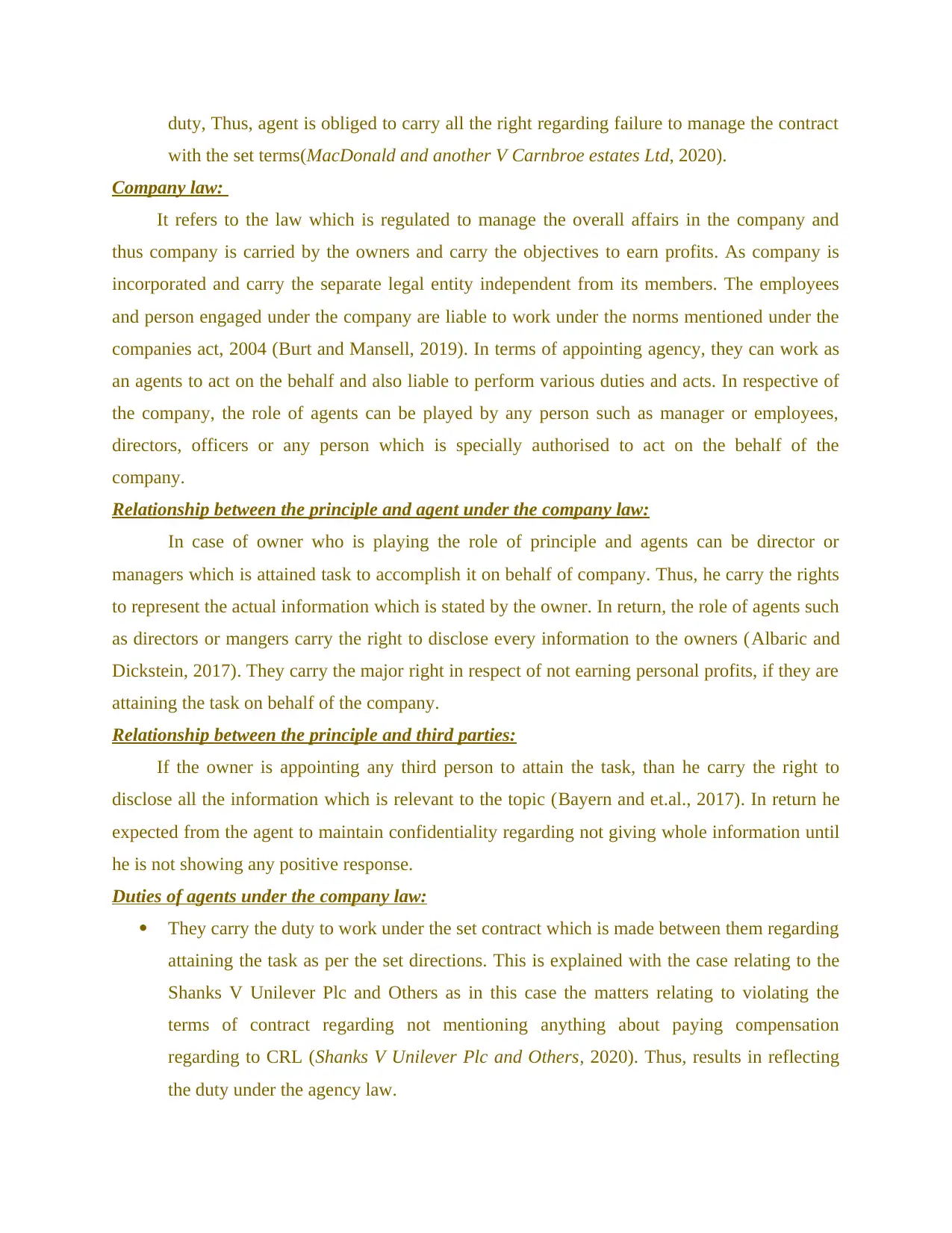
duty, Thus, agent is obliged to carry all the right regarding failure to manage the contract
with the set terms(MacDonald and another V Carnbroe estates Ltd, 2020).
Company law:
It refers to the law which is regulated to manage the overall affairs in the company and
thus company is carried by the owners and carry the objectives to earn profits. As company is
incorporated and carry the separate legal entity independent from its members. The employees
and person engaged under the company are liable to work under the norms mentioned under the
companies act, 2004 (Burt and Mansell, 2019). In terms of appointing agency, they can work as
an agents to act on the behalf and also liable to perform various duties and acts. In respective of
the company, the role of agents can be played by any person such as manager or employees,
directors, officers or any person which is specially authorised to act on the behalf of the
company.
Relationship between the principle and agent under the company law:
In case of owner who is playing the role of principle and agents can be director or
managers which is attained task to accomplish it on behalf of company. Thus, he carry the rights
to represent the actual information which is stated by the owner. In return, the role of agents such
as directors or mangers carry the right to disclose every information to the owners (Albaric and
Dickstein, 2017). They carry the major right in respect of not earning personal profits, if they are
attaining the task on behalf of the company.
Relationship between the principle and third parties:
If the owner is appointing any third person to attain the task, than he carry the right to
disclose all the information which is relevant to the topic (Bayern and et.al., 2017). In return he
expected from the agent to maintain confidentiality regarding not giving whole information until
he is not showing any positive response.
Duties of agents under the company law:
They carry the duty to work under the set contract which is made between them regarding
attaining the task as per the set directions. This is explained with the case relating to the
Shanks V Unilever Plc and Others as in this case the matters relating to violating the
terms of contract regarding not mentioning anything about paying compensation
regarding to CRL (Shanks V Unilever Plc and Others, 2020). Thus, results in reflecting
the duty under the agency law.
with the set terms(MacDonald and another V Carnbroe estates Ltd, 2020).
Company law:
It refers to the law which is regulated to manage the overall affairs in the company and
thus company is carried by the owners and carry the objectives to earn profits. As company is
incorporated and carry the separate legal entity independent from its members. The employees
and person engaged under the company are liable to work under the norms mentioned under the
companies act, 2004 (Burt and Mansell, 2019). In terms of appointing agency, they can work as
an agents to act on the behalf and also liable to perform various duties and acts. In respective of
the company, the role of agents can be played by any person such as manager or employees,
directors, officers or any person which is specially authorised to act on the behalf of the
company.
Relationship between the principle and agent under the company law:
In case of owner who is playing the role of principle and agents can be director or
managers which is attained task to accomplish it on behalf of company. Thus, he carry the rights
to represent the actual information which is stated by the owner. In return, the role of agents such
as directors or mangers carry the right to disclose every information to the owners (Albaric and
Dickstein, 2017). They carry the major right in respect of not earning personal profits, if they are
attaining the task on behalf of the company.
Relationship between the principle and third parties:
If the owner is appointing any third person to attain the task, than he carry the right to
disclose all the information which is relevant to the topic (Bayern and et.al., 2017). In return he
expected from the agent to maintain confidentiality regarding not giving whole information until
he is not showing any positive response.
Duties of agents under the company law:
They carry the duty to work under the set contract which is made between them regarding
attaining the task as per the set directions. This is explained with the case relating to the
Shanks V Unilever Plc and Others as in this case the matters relating to violating the
terms of contract regarding not mentioning anything about paying compensation
regarding to CRL (Shanks V Unilever Plc and Others, 2020). Thus, results in reflecting
the duty under the agency law.
⊘ This is a preview!⊘
Do you want full access?
Subscribe today to unlock all pages.

Trusted by 1+ million students worldwide
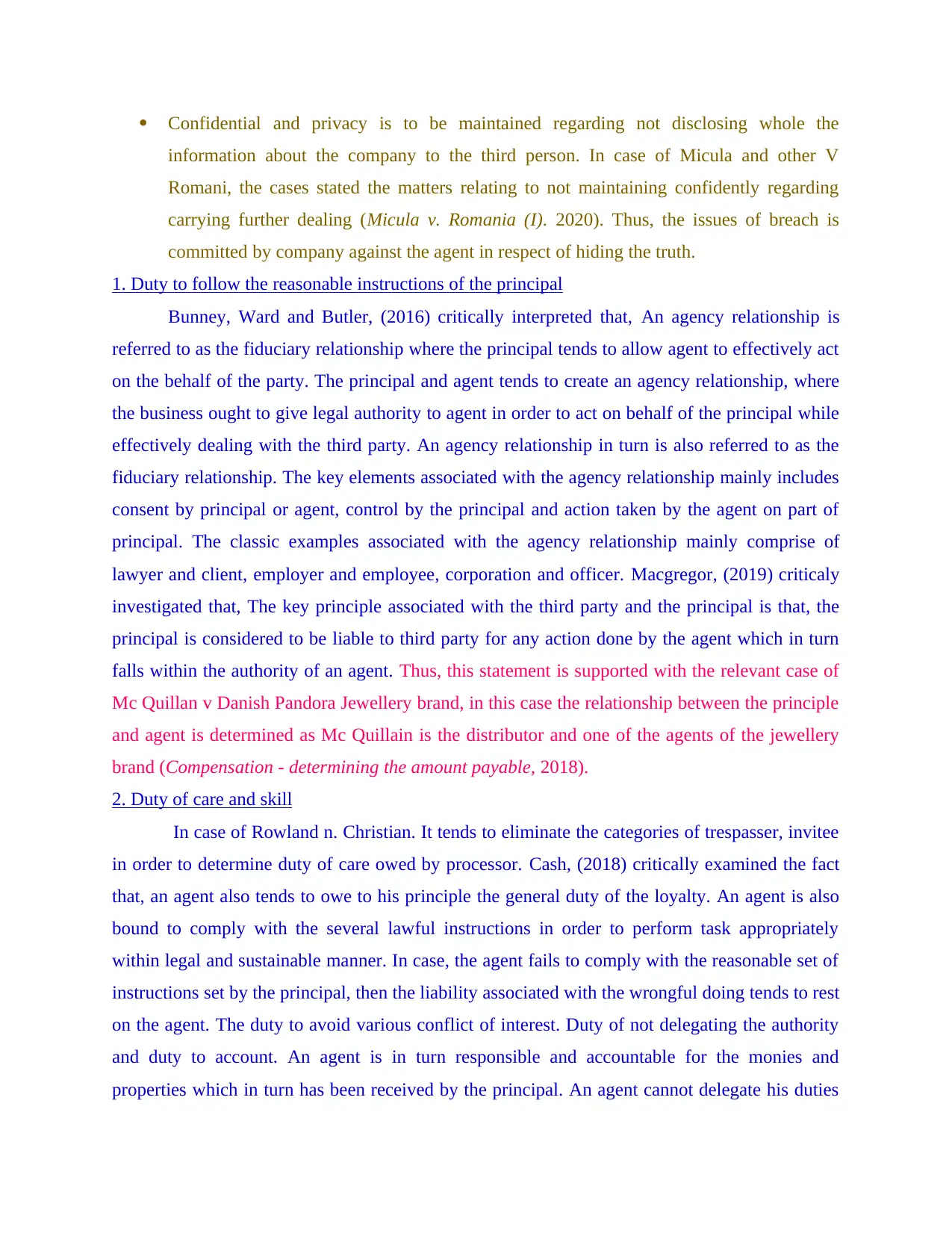
Confidential and privacy is to be maintained regarding not disclosing whole the
information about the company to the third person. In case of Micula and other V
Romani, the cases stated the matters relating to not maintaining confidently regarding
carrying further dealing (Micula v. Romania (I). 2020). Thus, the issues of breach is
committed by company against the agent in respect of hiding the truth.
1. Duty to follow the reasonable instructions of the principal
Bunney, Ward and Butler, (2016) critically interpreted that, An agency relationship is
referred to as the fiduciary relationship where the principal tends to allow agent to effectively act
on the behalf of the party. The principal and agent tends to create an agency relationship, where
the business ought to give legal authority to agent in order to act on behalf of the principal while
effectively dealing with the third party. An agency relationship in turn is also referred to as the
fiduciary relationship. The key elements associated with the agency relationship mainly includes
consent by principal or agent, control by the principal and action taken by the agent on part of
principal. The classic examples associated with the agency relationship mainly comprise of
lawyer and client, employer and employee, corporation and officer. Macgregor, (2019) criticaly
investigated that, The key principle associated with the third party and the principal is that, the
principal is considered to be liable to third party for any action done by the agent which in turn
falls within the authority of an agent. Thus, this statement is supported with the relevant case of
Mc Quillan v Danish Pandora Jewellery brand, in this case the relationship between the principle
and agent is determined as Mc Quillain is the distributor and one of the agents of the jewellery
brand (Compensation - determining the amount payable, 2018).
2. Duty of care and skill
In case of Rowland n. Christian. It tends to eliminate the categories of trespasser, invitee
in order to determine duty of care owed by processor. Cash, (2018) critically examined the fact
that, an agent also tends to owe to his principle the general duty of the loyalty. An agent is also
bound to comply with the several lawful instructions in order to perform task appropriately
within legal and sustainable manner. In case, the agent fails to comply with the reasonable set of
instructions set by the principal, then the liability associated with the wrongful doing tends to rest
on the agent. The duty to avoid various conflict of interest. Duty of not delegating the authority
and duty to account. An agent is in turn responsible and accountable for the monies and
properties which in turn has been received by the principal. An agent cannot delegate his duties
information about the company to the third person. In case of Micula and other V
Romani, the cases stated the matters relating to not maintaining confidently regarding
carrying further dealing (Micula v. Romania (I). 2020). Thus, the issues of breach is
committed by company against the agent in respect of hiding the truth.
1. Duty to follow the reasonable instructions of the principal
Bunney, Ward and Butler, (2016) critically interpreted that, An agency relationship is
referred to as the fiduciary relationship where the principal tends to allow agent to effectively act
on the behalf of the party. The principal and agent tends to create an agency relationship, where
the business ought to give legal authority to agent in order to act on behalf of the principal while
effectively dealing with the third party. An agency relationship in turn is also referred to as the
fiduciary relationship. The key elements associated with the agency relationship mainly includes
consent by principal or agent, control by the principal and action taken by the agent on part of
principal. The classic examples associated with the agency relationship mainly comprise of
lawyer and client, employer and employee, corporation and officer. Macgregor, (2019) criticaly
investigated that, The key principle associated with the third party and the principal is that, the
principal is considered to be liable to third party for any action done by the agent which in turn
falls within the authority of an agent. Thus, this statement is supported with the relevant case of
Mc Quillan v Danish Pandora Jewellery brand, in this case the relationship between the principle
and agent is determined as Mc Quillain is the distributor and one of the agents of the jewellery
brand (Compensation - determining the amount payable, 2018).
2. Duty of care and skill
In case of Rowland n. Christian. It tends to eliminate the categories of trespasser, invitee
in order to determine duty of care owed by processor. Cash, (2018) critically examined the fact
that, an agent also tends to owe to his principle the general duty of the loyalty. An agent is also
bound to comply with the several lawful instructions in order to perform task appropriately
within legal and sustainable manner. In case, the agent fails to comply with the reasonable set of
instructions set by the principal, then the liability associated with the wrongful doing tends to rest
on the agent. The duty to avoid various conflict of interest. Duty of not delegating the authority
and duty to account. An agent is in turn responsible and accountable for the monies and
properties which in turn has been received by the principal. An agent cannot delegate his duties
Paraphrase This Document
Need a fresh take? Get an instant paraphrase of this document with our AI Paraphraser
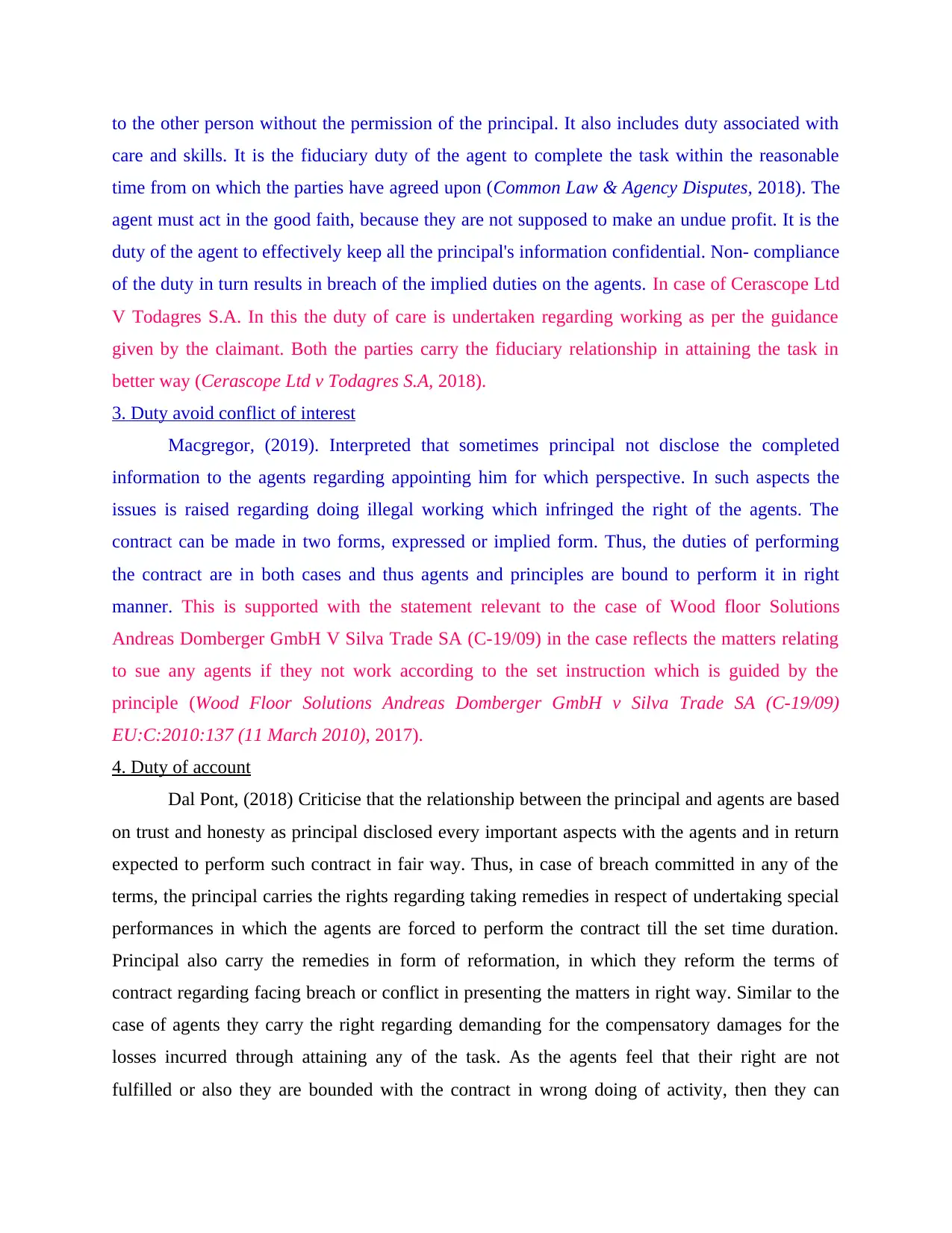
to the other person without the permission of the principal. It also includes duty associated with
care and skills. It is the fiduciary duty of the agent to complete the task within the reasonable
time from on which the parties have agreed upon (Common Law & Agency Disputes, 2018). The
agent must act in the good faith, because they are not supposed to make an undue profit. It is the
duty of the agent to effectively keep all the principal's information confidential. Non- compliance
of the duty in turn results in breach of the implied duties on the agents. In case of Cerascope Ltd
V Todagres S.A. In this the duty of care is undertaken regarding working as per the guidance
given by the claimant. Both the parties carry the fiduciary relationship in attaining the task in
better way (Cerascope Ltd v Todagres S.A, 2018).
3. Duty avoid conflict of interest
Macgregor, (2019). Interpreted that sometimes principal not disclose the completed
information to the agents regarding appointing him for which perspective. In such aspects the
issues is raised regarding doing illegal working which infringed the right of the agents. The
contract can be made in two forms, expressed or implied form. Thus, the duties of performing
the contract are in both cases and thus agents and principles are bound to perform it in right
manner. This is supported with the statement relevant to the case of Wood floor Solutions
Andreas Domberger GmbH V Silva Trade SA (C-19/09) in the case reflects the matters relating
to sue any agents if they not work according to the set instruction which is guided by the
principle (Wood Floor Solutions Andreas Domberger GmbH v Silva Trade SA (C-19/09)
EU:C:2010:137 (11 March 2010), 2017).
4. Duty of account
Dal Pont, (2018) Criticise that the relationship between the principal and agents are based
on trust and honesty as principal disclosed every important aspects with the agents and in return
expected to perform such contract in fair way. Thus, in case of breach committed in any of the
terms, the principal carries the rights regarding taking remedies in respect of undertaking special
performances in which the agents are forced to perform the contract till the set time duration.
Principal also carry the remedies in form of reformation, in which they reform the terms of
contract regarding facing breach or conflict in presenting the matters in right way. Similar to the
case of agents they carry the right regarding demanding for the compensatory damages for the
losses incurred through attaining any of the task. As the agents feel that their right are not
fulfilled or also they are bounded with the contract in wrong doing of activity, then they can
care and skills. It is the fiduciary duty of the agent to complete the task within the reasonable
time from on which the parties have agreed upon (Common Law & Agency Disputes, 2018). The
agent must act in the good faith, because they are not supposed to make an undue profit. It is the
duty of the agent to effectively keep all the principal's information confidential. Non- compliance
of the duty in turn results in breach of the implied duties on the agents. In case of Cerascope Ltd
V Todagres S.A. In this the duty of care is undertaken regarding working as per the guidance
given by the claimant. Both the parties carry the fiduciary relationship in attaining the task in
better way (Cerascope Ltd v Todagres S.A, 2018).
3. Duty avoid conflict of interest
Macgregor, (2019). Interpreted that sometimes principal not disclose the completed
information to the agents regarding appointing him for which perspective. In such aspects the
issues is raised regarding doing illegal working which infringed the right of the agents. The
contract can be made in two forms, expressed or implied form. Thus, the duties of performing
the contract are in both cases and thus agents and principles are bound to perform it in right
manner. This is supported with the statement relevant to the case of Wood floor Solutions
Andreas Domberger GmbH V Silva Trade SA (C-19/09) in the case reflects the matters relating
to sue any agents if they not work according to the set instruction which is guided by the
principle (Wood Floor Solutions Andreas Domberger GmbH v Silva Trade SA (C-19/09)
EU:C:2010:137 (11 March 2010), 2017).
4. Duty of account
Dal Pont, (2018) Criticise that the relationship between the principal and agents are based
on trust and honesty as principal disclosed every important aspects with the agents and in return
expected to perform such contract in fair way. Thus, in case of breach committed in any of the
terms, the principal carries the rights regarding taking remedies in respect of undertaking special
performances in which the agents are forced to perform the contract till the set time duration.
Principal also carry the remedies in form of reformation, in which they reform the terms of
contract regarding facing breach or conflict in presenting the matters in right way. Similar to the
case of agents they carry the right regarding demanding for the compensatory damages for the
losses incurred through attaining any of the task. As the agents feel that their right are not
fulfilled or also they are bounded with the contract in wrong doing of activity, then they can
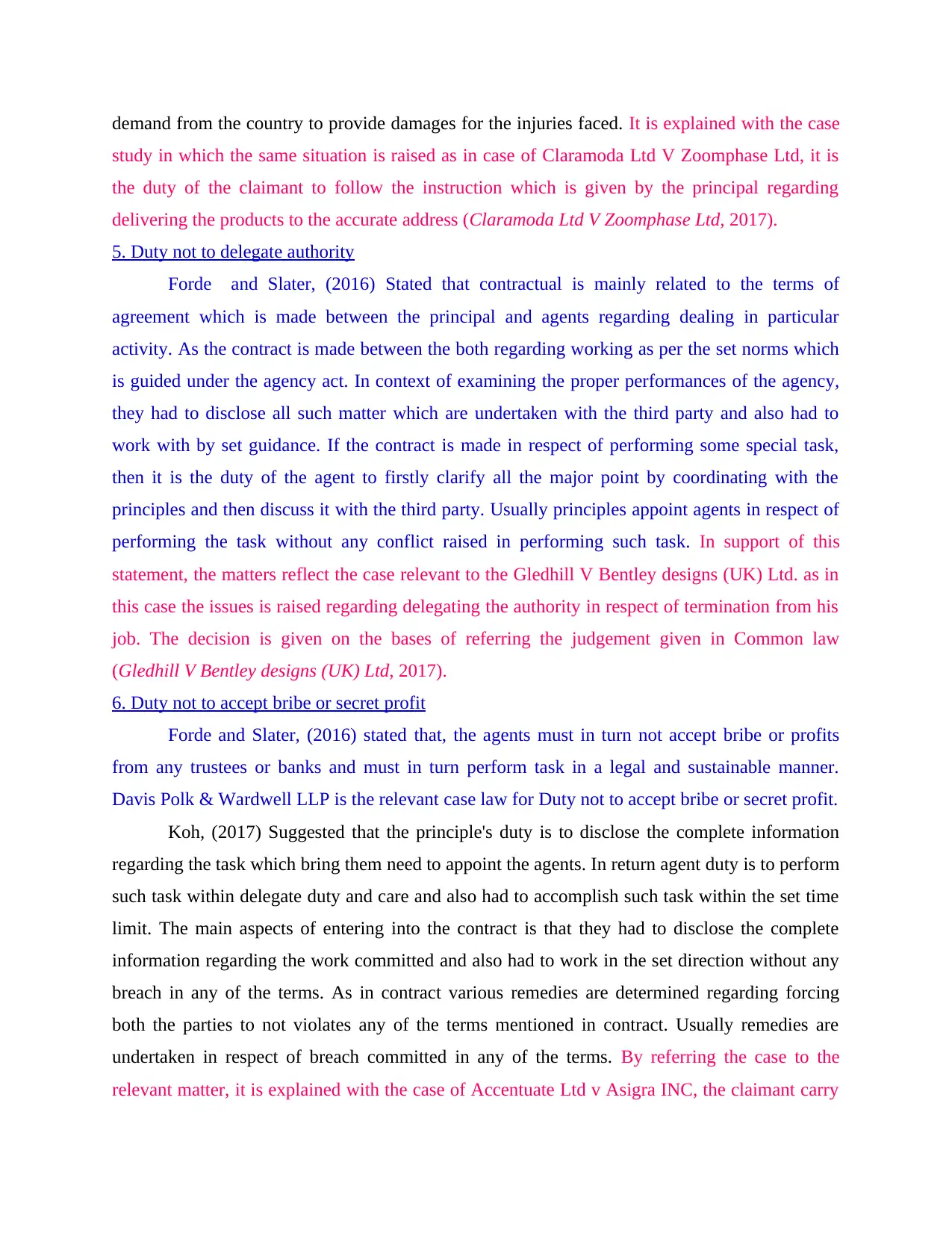
demand from the country to provide damages for the injuries faced. It is explained with the case
study in which the same situation is raised as in case of Claramoda Ltd V Zoomphase Ltd, it is
the duty of the claimant to follow the instruction which is given by the principal regarding
delivering the products to the accurate address (Claramoda Ltd V Zoomphase Ltd, 2017).
5. Duty not to delegate authority
Forde and Slater, (2016) Stated that contractual is mainly related to the terms of
agreement which is made between the principal and agents regarding dealing in particular
activity. As the contract is made between the both regarding working as per the set norms which
is guided under the agency act. In context of examining the proper performances of the agency,
they had to disclose all such matter which are undertaken with the third party and also had to
work with by set guidance. If the contract is made in respect of performing some special task,
then it is the duty of the agent to firstly clarify all the major point by coordinating with the
principles and then discuss it with the third party. Usually principles appoint agents in respect of
performing the task without any conflict raised in performing such task. In support of this
statement, the matters reflect the case relevant to the Gledhill V Bentley designs (UK) Ltd. as in
this case the issues is raised regarding delegating the authority in respect of termination from his
job. The decision is given on the bases of referring the judgement given in Common law
(Gledhill V Bentley designs (UK) Ltd, 2017).
6. Duty not to accept bribe or secret profit
Forde and Slater, (2016) stated that, the agents must in turn not accept bribe or profits
from any trustees or banks and must in turn perform task in a legal and sustainable manner.
Davis Polk & Wardwell LLP is the relevant case law for Duty not to accept bribe or secret profit.
Koh, (2017) Suggested that the principle's duty is to disclose the complete information
regarding the task which bring them need to appoint the agents. In return agent duty is to perform
such task within delegate duty and care and also had to accomplish such task within the set time
limit. The main aspects of entering into the contract is that they had to disclose the complete
information regarding the work committed and also had to work in the set direction without any
breach in any of the terms. As in contract various remedies are determined regarding forcing
both the parties to not violates any of the terms mentioned in contract. Usually remedies are
undertaken in respect of breach committed in any of the terms. By referring the case to the
relevant matter, it is explained with the case of Accentuate Ltd v Asigra INC, the claimant carry
study in which the same situation is raised as in case of Claramoda Ltd V Zoomphase Ltd, it is
the duty of the claimant to follow the instruction which is given by the principal regarding
delivering the products to the accurate address (Claramoda Ltd V Zoomphase Ltd, 2017).
5. Duty not to delegate authority
Forde and Slater, (2016) Stated that contractual is mainly related to the terms of
agreement which is made between the principal and agents regarding dealing in particular
activity. As the contract is made between the both regarding working as per the set norms which
is guided under the agency act. In context of examining the proper performances of the agency,
they had to disclose all such matter which are undertaken with the third party and also had to
work with by set guidance. If the contract is made in respect of performing some special task,
then it is the duty of the agent to firstly clarify all the major point by coordinating with the
principles and then discuss it with the third party. Usually principles appoint agents in respect of
performing the task without any conflict raised in performing such task. In support of this
statement, the matters reflect the case relevant to the Gledhill V Bentley designs (UK) Ltd. as in
this case the issues is raised regarding delegating the authority in respect of termination from his
job. The decision is given on the bases of referring the judgement given in Common law
(Gledhill V Bentley designs (UK) Ltd, 2017).
6. Duty not to accept bribe or secret profit
Forde and Slater, (2016) stated that, the agents must in turn not accept bribe or profits
from any trustees or banks and must in turn perform task in a legal and sustainable manner.
Davis Polk & Wardwell LLP is the relevant case law for Duty not to accept bribe or secret profit.
Koh, (2017) Suggested that the principle's duty is to disclose the complete information
regarding the task which bring them need to appoint the agents. In return agent duty is to perform
such task within delegate duty and care and also had to accomplish such task within the set time
limit. The main aspects of entering into the contract is that they had to disclose the complete
information regarding the work committed and also had to work in the set direction without any
breach in any of the terms. As in contract various remedies are determined regarding forcing
both the parties to not violates any of the terms mentioned in contract. Usually remedies are
undertaken in respect of breach committed in any of the terms. By referring the case to the
relevant matter, it is explained with the case of Accentuate Ltd v Asigra INC, the claimant carry
⊘ This is a preview!⊘
Do you want full access?
Subscribe today to unlock all pages.

Trusted by 1+ million students worldwide
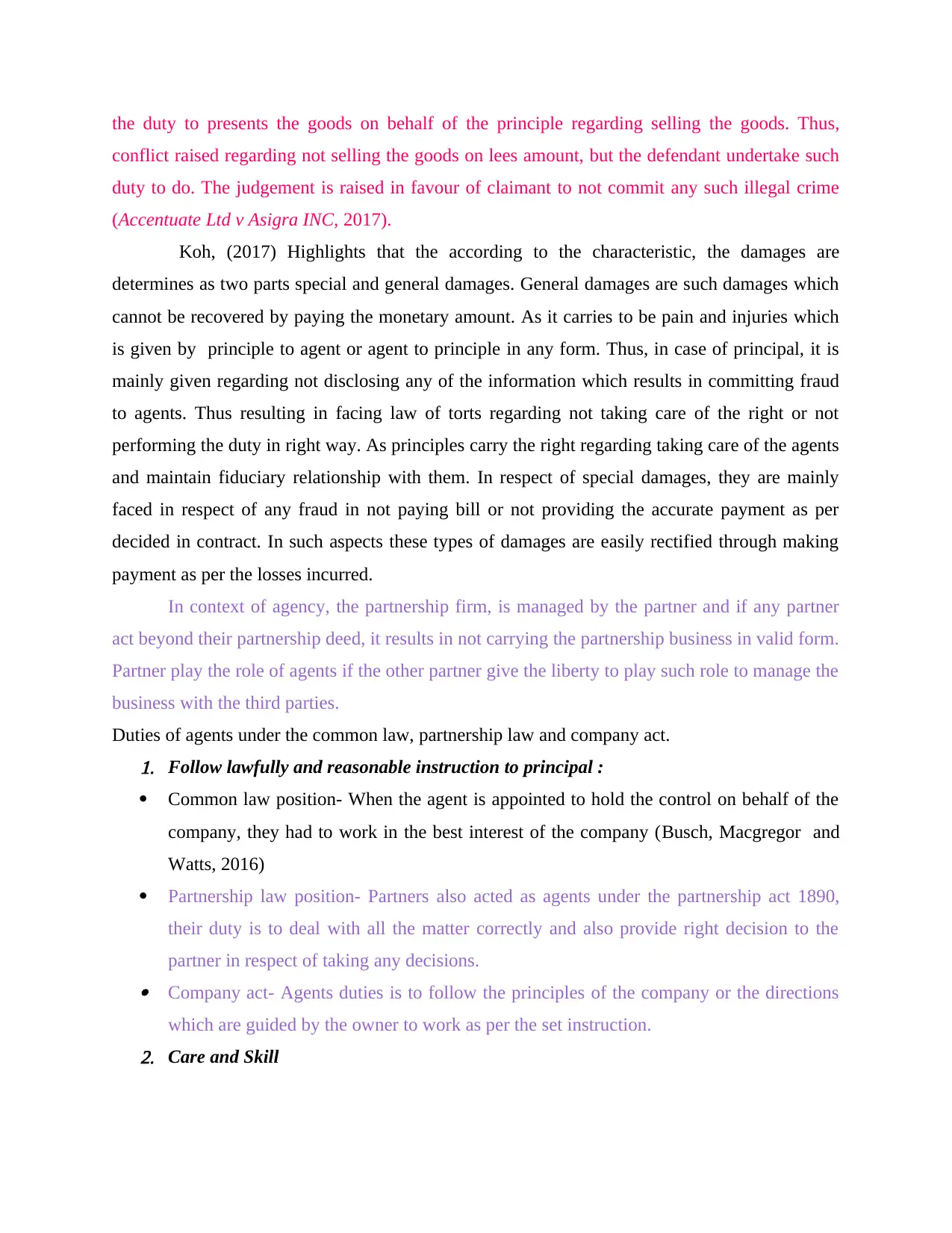
the duty to presents the goods on behalf of the principle regarding selling the goods. Thus,
conflict raised regarding not selling the goods on lees amount, but the defendant undertake such
duty to do. The judgement is raised in favour of claimant to not commit any such illegal crime
(Accentuate Ltd v Asigra INC, 2017).
Koh, (2017) Highlights that the according to the characteristic, the damages are
determines as two parts special and general damages. General damages are such damages which
cannot be recovered by paying the monetary amount. As it carries to be pain and injuries which
is given by principle to agent or agent to principle in any form. Thus, in case of principal, it is
mainly given regarding not disclosing any of the information which results in committing fraud
to agents. Thus resulting in facing law of torts regarding not taking care of the right or not
performing the duty in right way. As principles carry the right regarding taking care of the agents
and maintain fiduciary relationship with them. In respect of special damages, they are mainly
faced in respect of any fraud in not paying bill or not providing the accurate payment as per
decided in contract. In such aspects these types of damages are easily rectified through making
payment as per the losses incurred.
In context of agency, the partnership firm, is managed by the partner and if any partner
act beyond their partnership deed, it results in not carrying the partnership business in valid form.
Partner play the role of agents if the other partner give the liberty to play such role to manage the
business with the third parties.
Duties of agents under the common law, partnership law and company act.1. Follow lawfully and reasonable instruction to principal :
Common law position- When the agent is appointed to hold the control on behalf of the
company, they had to work in the best interest of the company (Busch, Macgregor and
Watts, 2016)
Partnership law position- Partners also acted as agents under the partnership act 1890,
their duty is to deal with all the matter correctly and also provide right decision to the
partner in respect of taking any decisions. Company act- Agents duties is to follow the principles of the company or the directions
which are guided by the owner to work as per the set instruction.2. Care and Skill
conflict raised regarding not selling the goods on lees amount, but the defendant undertake such
duty to do. The judgement is raised in favour of claimant to not commit any such illegal crime
(Accentuate Ltd v Asigra INC, 2017).
Koh, (2017) Highlights that the according to the characteristic, the damages are
determines as two parts special and general damages. General damages are such damages which
cannot be recovered by paying the monetary amount. As it carries to be pain and injuries which
is given by principle to agent or agent to principle in any form. Thus, in case of principal, it is
mainly given regarding not disclosing any of the information which results in committing fraud
to agents. Thus resulting in facing law of torts regarding not taking care of the right or not
performing the duty in right way. As principles carry the right regarding taking care of the agents
and maintain fiduciary relationship with them. In respect of special damages, they are mainly
faced in respect of any fraud in not paying bill or not providing the accurate payment as per
decided in contract. In such aspects these types of damages are easily rectified through making
payment as per the losses incurred.
In context of agency, the partnership firm, is managed by the partner and if any partner
act beyond their partnership deed, it results in not carrying the partnership business in valid form.
Partner play the role of agents if the other partner give the liberty to play such role to manage the
business with the third parties.
Duties of agents under the common law, partnership law and company act.1. Follow lawfully and reasonable instruction to principal :
Common law position- When the agent is appointed to hold the control on behalf of the
company, they had to work in the best interest of the company (Busch, Macgregor and
Watts, 2016)
Partnership law position- Partners also acted as agents under the partnership act 1890,
their duty is to deal with all the matter correctly and also provide right decision to the
partner in respect of taking any decisions. Company act- Agents duties is to follow the principles of the company or the directions
which are guided by the owner to work as per the set instruction.2. Care and Skill
Paraphrase This Document
Need a fresh take? Get an instant paraphrase of this document with our AI Paraphraser
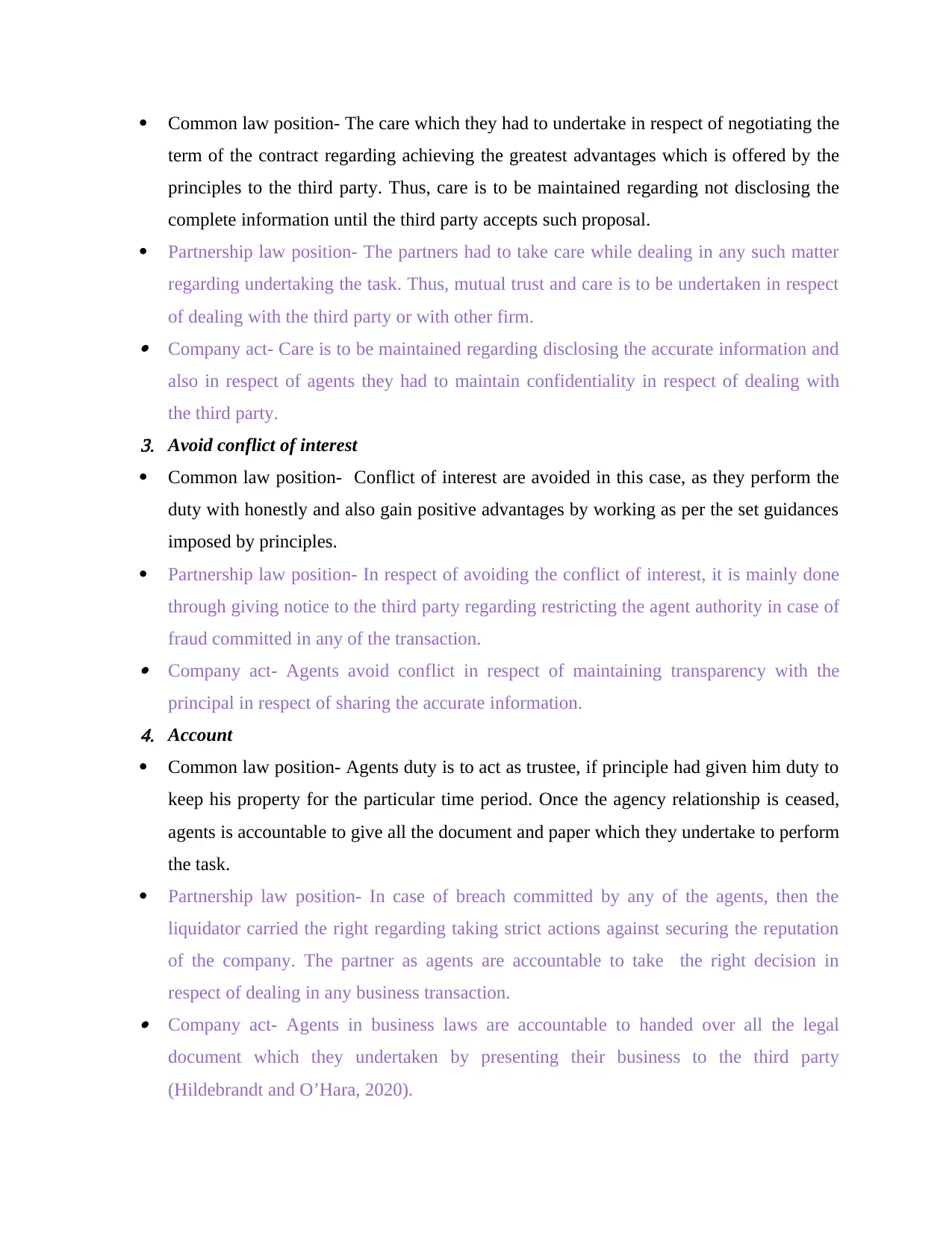
Common law position- The care which they had to undertake in respect of negotiating the
term of the contract regarding achieving the greatest advantages which is offered by the
principles to the third party. Thus, care is to be maintained regarding not disclosing the
complete information until the third party accepts such proposal.
Partnership law position- The partners had to take care while dealing in any such matter
regarding undertaking the task. Thus, mutual trust and care is to be undertaken in respect
of dealing with the third party or with other firm. Company act- Care is to be maintained regarding disclosing the accurate information and
also in respect of agents they had to maintain confidentiality in respect of dealing with
the third party.3. Avoid conflict of interest
Common law position- Conflict of interest are avoided in this case, as they perform the
duty with honestly and also gain positive advantages by working as per the set guidances
imposed by principles.
Partnership law position- In respect of avoiding the conflict of interest, it is mainly done
through giving notice to the third party regarding restricting the agent authority in case of
fraud committed in any of the transaction. Company act- Agents avoid conflict in respect of maintaining transparency with the
principal in respect of sharing the accurate information.4. Account
Common law position- Agents duty is to act as trustee, if principle had given him duty to
keep his property for the particular time period. Once the agency relationship is ceased,
agents is accountable to give all the document and paper which they undertake to perform
the task.
Partnership law position- In case of breach committed by any of the agents, then the
liquidator carried the right regarding taking strict actions against securing the reputation
of the company. The partner as agents are accountable to take the right decision in
respect of dealing in any business transaction. Company act- Agents in business laws are accountable to handed over all the legal
document which they undertaken by presenting their business to the third party
(Hildebrandt and O’Hara, 2020).
term of the contract regarding achieving the greatest advantages which is offered by the
principles to the third party. Thus, care is to be maintained regarding not disclosing the
complete information until the third party accepts such proposal.
Partnership law position- The partners had to take care while dealing in any such matter
regarding undertaking the task. Thus, mutual trust and care is to be undertaken in respect
of dealing with the third party or with other firm. Company act- Care is to be maintained regarding disclosing the accurate information and
also in respect of agents they had to maintain confidentiality in respect of dealing with
the third party.3. Avoid conflict of interest
Common law position- Conflict of interest are avoided in this case, as they perform the
duty with honestly and also gain positive advantages by working as per the set guidances
imposed by principles.
Partnership law position- In respect of avoiding the conflict of interest, it is mainly done
through giving notice to the third party regarding restricting the agent authority in case of
fraud committed in any of the transaction. Company act- Agents avoid conflict in respect of maintaining transparency with the
principal in respect of sharing the accurate information.4. Account
Common law position- Agents duty is to act as trustee, if principle had given him duty to
keep his property for the particular time period. Once the agency relationship is ceased,
agents is accountable to give all the document and paper which they undertake to perform
the task.
Partnership law position- In case of breach committed by any of the agents, then the
liquidator carried the right regarding taking strict actions against securing the reputation
of the company. The partner as agents are accountable to take the right decision in
respect of dealing in any business transaction. Company act- Agents in business laws are accountable to handed over all the legal
document which they undertaken by presenting their business to the third party
(Hildebrandt and O’Hara, 2020).
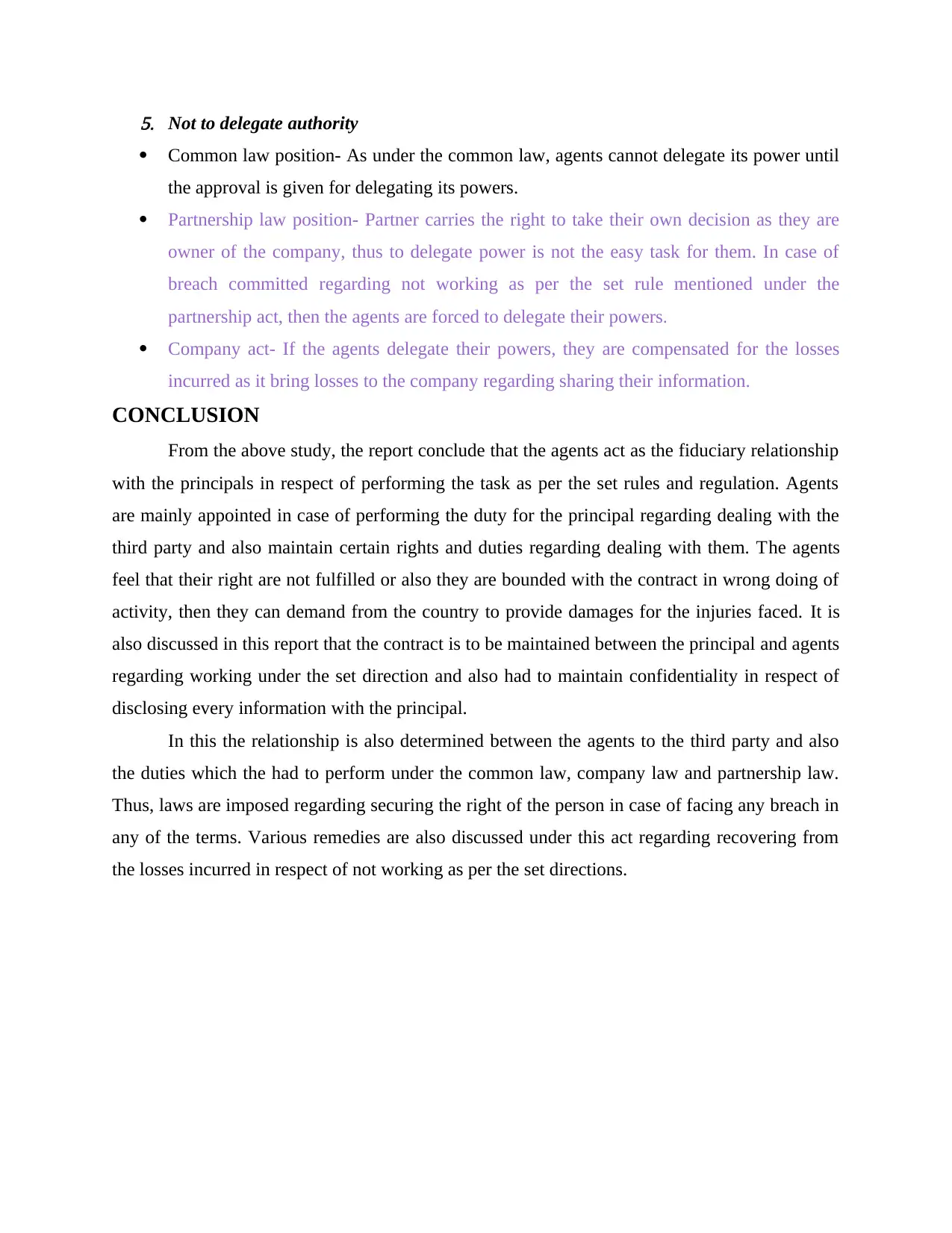
5. Not to delegate authority
Common law position- As under the common law, agents cannot delegate its power until
the approval is given for delegating its powers.
Partnership law position- Partner carries the right to take their own decision as they are
owner of the company, thus to delegate power is not the easy task for them. In case of
breach committed regarding not working as per the set rule mentioned under the
partnership act, then the agents are forced to delegate their powers.
Company act- If the agents delegate their powers, they are compensated for the losses
incurred as it bring losses to the company regarding sharing their information.
CONCLUSION
From the above study, the report conclude that the agents act as the fiduciary relationship
with the principals in respect of performing the task as per the set rules and regulation. Agents
are mainly appointed in case of performing the duty for the principal regarding dealing with the
third party and also maintain certain rights and duties regarding dealing with them. The agents
feel that their right are not fulfilled or also they are bounded with the contract in wrong doing of
activity, then they can demand from the country to provide damages for the injuries faced. It is
also discussed in this report that the contract is to be maintained between the principal and agents
regarding working under the set direction and also had to maintain confidentiality in respect of
disclosing every information with the principal.
In this the relationship is also determined between the agents to the third party and also
the duties which the had to perform under the common law, company law and partnership law.
Thus, laws are imposed regarding securing the right of the person in case of facing any breach in
any of the terms. Various remedies are also discussed under this act regarding recovering from
the losses incurred in respect of not working as per the set directions.
Common law position- As under the common law, agents cannot delegate its power until
the approval is given for delegating its powers.
Partnership law position- Partner carries the right to take their own decision as they are
owner of the company, thus to delegate power is not the easy task for them. In case of
breach committed regarding not working as per the set rule mentioned under the
partnership act, then the agents are forced to delegate their powers.
Company act- If the agents delegate their powers, they are compensated for the losses
incurred as it bring losses to the company regarding sharing their information.
CONCLUSION
From the above study, the report conclude that the agents act as the fiduciary relationship
with the principals in respect of performing the task as per the set rules and regulation. Agents
are mainly appointed in case of performing the duty for the principal regarding dealing with the
third party and also maintain certain rights and duties regarding dealing with them. The agents
feel that their right are not fulfilled or also they are bounded with the contract in wrong doing of
activity, then they can demand from the country to provide damages for the injuries faced. It is
also discussed in this report that the contract is to be maintained between the principal and agents
regarding working under the set direction and also had to maintain confidentiality in respect of
disclosing every information with the principal.
In this the relationship is also determined between the agents to the third party and also
the duties which the had to perform under the common law, company law and partnership law.
Thus, laws are imposed regarding securing the right of the person in case of facing any breach in
any of the terms. Various remedies are also discussed under this act regarding recovering from
the losses incurred in respect of not working as per the set directions.
⊘ This is a preview!⊘
Do you want full access?
Subscribe today to unlock all pages.

Trusted by 1+ million students worldwide
1 out of 15
Related Documents
Your All-in-One AI-Powered Toolkit for Academic Success.
+13062052269
info@desklib.com
Available 24*7 on WhatsApp / Email
![[object Object]](/_next/static/media/star-bottom.7253800d.svg)
Unlock your academic potential
Copyright © 2020–2026 A2Z Services. All Rights Reserved. Developed and managed by ZUCOL.




